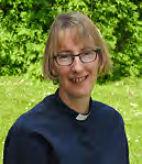Vicar's Letter
February 2020

February is often thought of as a month for love as we celebrate St Valentine's Day on 14th February. It is the time when the earth is awakening after winter and birds begin to mate. Wales has its own patron saint for lovers, St Dwynwen. Her Feast Day is celebrated in Wales on 25th January.
Dwynwen lived during the 5th century and legend has it that she was one of the prettiest of Brychan Brycheiniog's 24 daughters. Dwynwen fell in love with a prince called Maelon Dafodrill, but unfortunately her father had already arranged that she should marry someone else. Dwynwen was so upset that she could not marry Maelon that she begged God to make her forget him. After falling asleep, Dwynwen was visited by an angel, who appeared carrying a sweet potion designed to erase all memory of Maelon and turn him into a block of ice.
God then gave three wishes to Dwynwen. Her first wish was that Maelon be thawed; her second that God meet the hopes and dreams of true lovers; and third, that she should never marry. All three were fulfilled, and as a mark of her thanks, Dwynwen devoted herself to God's service for the rest of her life. Her name means 'she who leads a blessed life.'
She founded a convent on Llanddwyn, off the west coast of Anglesey. Following her death in 465AD a well named after her became a place of pilgrimage. Visitors to the well believed that the sacred fish or eels that lived in the well could foretell whether or not their relationship would be loving and whether or not happiness would be theirs. Remains of Dwynwen's church can still be seen today.
Romantic love is only one form of love. When Jesus was asked to summarise the Ten Commandments he said: 'Love God and love your neighbour as you love yourself.' Loving God means that our focus is directed beyond ourselves. Christians believe that God is love and that he has created the earth and all that is in it. To love God is to praise and thank him for all the good things he has made. It is to make space for him in our lives and to honour him by how we live our lives.
In addition to loving God we are also called to love our neighbour. When Jesus was asked 'who is my neighbour?' he told the parable of the Good Samaritan. Your neighbour, he explained, is anyone who is in need. And in another part of the gospels, Jesus explains what this entails. It means creating a world where the hungry are fed, the thirsty are given drink, the naked are clothed and the sick and imprisoned are visited. Love is shown in very practical ways.
In order to love others, we must also be able to love ourselves. That means facing up to the parts of ourselves that we find difficult, the things which we would rather avoid. The church encourages us to come to God openly with all our faults and failings. He loves us and longs to draw close. He offers forgiveness for those who are truly sorry and the opportunity to begin afresh.
Ash Wednesday falls at the end of February this year. It is a reminder of the grace of God and the depth of the divine love for each one of us.
Wishing you every blessing
Joy (Vicar of Eaton Bray with Edlesborough)
Letter Archives
2020
- February 2020
- March 2020
- April 2020
- May 2020
- June 2020
- July 2020
- August / September 2020
- October 2020
- November 2020
- December 2020
Other Years
About the Vicar's Letter
The Vicar's Letter has been appearing in the villages Focus magazine since August 2002.
The Rev. Peter Graham also used to publish The Vicar's Letter in the parish magazine of 1964. Please see the Vicar's Letter area for these.